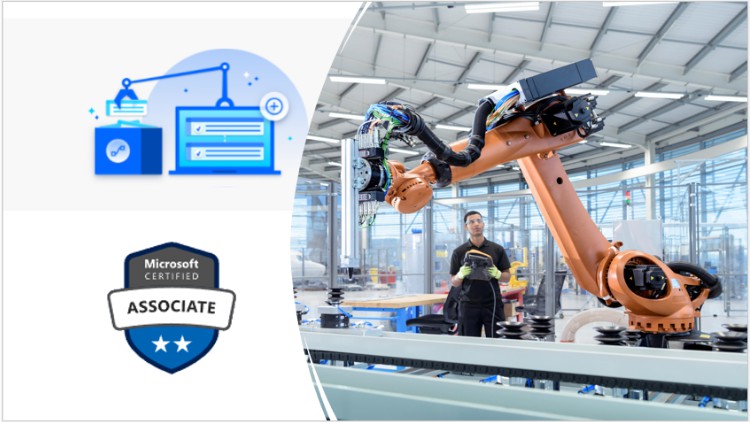
Course Structure as per latest Exam PL-500: Microsoft Power Automate RPA Developer Study Guide
What you will learn
Automation Skills: Automate Windows, browser, and terminal applications using UI, API, and database approaches.
Process Analysis and Design: Candidates will learn how to thoroughly analyze existing processes and design optimized workflows for automation.
Power Automate Proficiency: Implement automations with Power Automate for desktop and cloud flows.
RPA Development: Create logic and interact with data, applications, and services using actions.
Workflow Optimization: Collaborate with stakeholders to optimize business workflows.
Deployment and Support: Deploy solutions to various environments and provide ongoing support.
Technical Competencies: Gain proficiency in Windows desktop, scripting, Power Automate, AI Builder, Process Advisor, and Microsoft Dataverse.
Description
Discover the Power of Automation with Microsoft Power Automate (PL-500)
Unlock the potential of automation with our comprehensive course on Microsoft Power Automate (PL-500). Designed to empower learners with the essential knowledge and skills, this course equips you to design, develop, and proficiently manage automated solutions.
Course Highlights:
- Understanding Power Automate: Dive into the world of Power Automate, exploring its robust features and capabilities.
- Choosing the Right Automation: Learn how to identify the most suitable automation types for diverse tasks.
- Integration with Power Platform: Seamlessly integrate Power Automate with other Microsoft Power Platform offerings for enhanced functionality.
- Process Recording and Analysis: Master the art of recording and analyzing processes to identify optimization opportunities.
- AI-Powered Enhancements: Discover how to leverage Microsoft AI to enhance data and documents within your automated solutions.
- Automation Development: Develop efficient automations that streamline processes and boost productivity.
- Cloud and Desktop Flows: Gain expertise in creating and managing both cloud and desktop flows.
- Deployment and Management: Learn how to deploy and manage automations across different environments with precision.
Hands-On Learning:
This course is not just theory; it’s hands-on and practical. Participants will engage in practical exercises and real-world scenarios, enabling them to apply their newfound knowledge immediately.
Join us on a transformative journey into the world of automation with Microsoft Power Automate. Equip yourself with the skills that drive efficiency, productivity, and innovation in today’s fast-paced business landscape.
Course Outline:
Course Introduction
· Course Introduction
Module: Introduction to Power Automate
· Overview of Power Automate
· Power Automate Features and Capabilities
· Demo – Build an Automated Cloud Flow
· Power Automate Ecosystem and Offerings
Module: Setting Up Power Automate Lab Environment
· Obtaining Your Free Microsoft 365 E5 Tenant
· Setting Up Effective Test and Development Environments
· Demo of Creating Environments
· Configuring Power Automate for Desktop Software
· Assign and Extend Power Automate Premium License
Module: Cloud Flows, Desktop Flows, and Business Process Flows
· Differences Among Cloud Flows, Desktop Flows, and Business Process Flows
· When to Use a Desktop Flow or a Cloud Flow, and When to Use Them Together
· Demo – Calling Desktop Flow from Cloud Flow
Module: Record and Analyze Processes (Process Mining)
· Understanding Process Mining with Power Automate
· Transferring Lab Resources for Hands-on Practice
· Understand Process Scenario
· Use Process Mining with Data Method
· Review analytics of Process Mining
· Use Task Mining with Recording Method
· Create and Assign Activity Names
· Review analytics of Task Mining
Important Notice: The following Course Modules are Under Development :
We are continuously enhancing this course to provide you with the most comprehensive learning experience. Please note that not all modules are currently available. Our dedicated team is actively working to create new lectures and every two days, we will release new lectures based on the following modules.
We appreciate your patience and encourage you to start with the available lectures to get a head start on your learning journey. Thank you for your understanding as we strive to deliver a top-notch course.
Module : Developing Desktop Flows
Module : Developing Cloud Flows
Module : Logic in Cloud and Desktop Flows
Module : Creating and Managing Custom Connectors
Module : Managing Automation Infrastructure
Module : Testing and Finalizing Development Efforts
Module : Deploying and Managing Automation
Module : Managing Access to RPA Components
Module : Evaluating Cloud and Desktop Flow Run History
By the end of this course, participants will have a deep understanding of Power Automate features, capabilities, and how to design, develop, deploy, and manage automated solutions effectively using Microsoft Power Automate.
Content